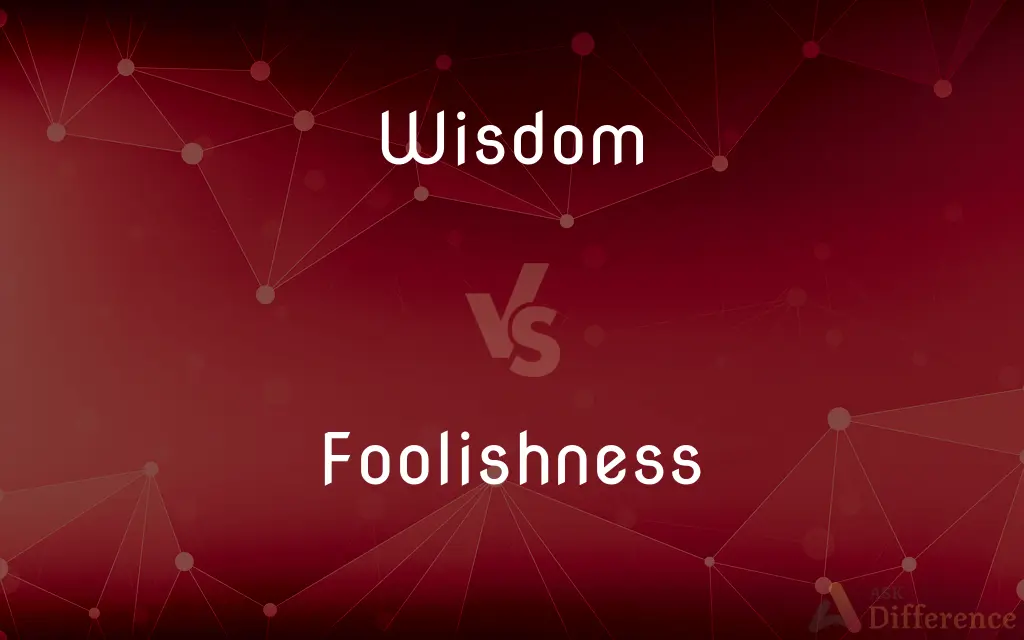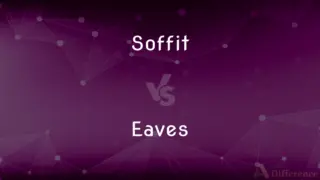Wisdom vs. Foolishness — What's the Difference?
By Tayyaba Rehman & Urooj Arif — Updated on March 21, 2024
Wisdom involves deep understanding and the judicious application of knowledge, while foolishness is marked by a lack of judgment and disregard for consequences.

Difference Between Wisdom and Foolishness
Table of Contents
ADVERTISEMENT
Key Differences
Wisdom is characterized by the capacity to make sound decisions based on knowledge, experience, and insightful understanding. It involves recognizing the long-term implications of one's actions and choosing the path that leads to the best outcome for all involved. On the other hand, foolishness is often defined by a lack of understanding, poor judgment, and a failure to consider the repercussions of one’s actions, leading to outcomes that can be detrimental to oneself and others.
Individuals who embody wisdom are not only knowledgeable but are also adept at applying their knowledge in practical and meaningful ways. They are often seen as individuals who think before they act, weighing the pros and cons of their decisions. Conversely, foolishness is marked by impulsive actions without much thought for the future, resulting in decisions that can be harmful or counterproductive.
Wisdom also involves the ability to learn from past experiences, not just one's own but also those of others. This allows for personal growth and the avoidance of repeated mistakes. In contrast, foolishness may involve repeating the same errors due to a failure to reflect on past outcomes or a stubborn refusal to learn from previous missteps.
A wise individual seeks to understand different perspectives and is open to new information, which facilitates better decision-making. Foolishness, however, is often accompanied by a closed-minded attitude that rejects differing viewpoints or new information, leading to a narrow understanding of the world.
Wisdom is associated with the ability to adapt to changing circumstances and to find innovative solutions to complex problems. Foolishness, on the other hand, may manifest as rigidity in thinking or an inability to adapt, which can hinder problem-solving and lead to poor outcomes.
ADVERTISEMENT
Comparison Chart
Decision-making
Judicious, informed by knowledge and experience
Poor, lacking judgment and foresight
Consideration of Consequences
Thinks about long-term impacts
Ignores or underestimates repercussions
Learning from Experience
Reflects on and learns from past actions
Repeats mistakes, lacks reflection
Openness to New Information
Seeks and values different perspectives
Closed-minded, resistant to new ideas
Adaptability
Adapts to change, innovative in problem-solving
Rigid, struggles with change and complexity
Compare with Definitions
Wisdom
Involves judicious application of knowledge.
Wisdom lies in knowing when to speak and when to listen.
Foolishness
Characterized by repeating mistakes.
It was foolishness to repeat the error, expecting different results.
Wisdom
The ability to make sound decisions based on knowledge and experience.
Her wisdom in handling complex issues earned her respect among her peers.
Foolishness
Involves making decisions without foresight.
Their foolishness in spending left them in financial trouble.
Wisdom
Seeks to learn from past experiences.
Through wisdom, she avoided past mistakes in her new project.
Foolishness
Closed to new information or perspectives.
Foolishness led them to dismiss the expert's advice.
Wisdom
Reflects deep understanding and insight.
His advice always reflected a wisdom beyond his years.
Foolishness
Struggles with adaptability and innovation.
Their foolishness was apparent in their inability to adapt to market changes.
Wisdom
Adaptable and open to new ideas.
His wisdom was evident in how he adapted to technological changes.
Foolishness
Marked by a lack of judgment or consideration for the future.
The decision was made in a moment of foolishness and regretted later.
Wisdom
Wisdom, sapience, or sagacity is the ability to think and act using knowledge, experience, understanding, common sense and insight. Wisdom is associated with attributes such as unbiased judgment, compassion, experiential self-knowledge, self-transcendence and non-attachment, and virtues such as ethics and benevolence.Wisdom has been defined in many different ways, including several distinct approaches to assess the characteristics attributed to wisdom.
Foolishness
Foolishness is the unawareness or lack of social norms which causes offence, annoyance, trouble and/or injury. The things such as impulsivity and/or influences may affect a person's ability to make otherwise reasonable decisions.
Wisdom
The ability to discern or judge what is true, right, or lasting; insight.
Foolishness
Lacking or exhibiting a lack of good sense or judgment; silly
A foolish boy.
A foolish purchase.
Wisdom
Common sense; good judgment
"It is a characteristic of wisdom not to do desperate things" (Henry David Thoreau).
Foolishness
Capable of arousing laughter; absurd or ridiculous
A foolish grin.
Wisdom
The sum of learning through the ages; knowledge
"In those homely sayings was couched the collective wisdom of generations" (Maya Angelou).
Foolishness
Embarrassed; abashed
I feel foolish telling you this.
Wisdom
Wise teachings of the ancient sages.
Foolishness
Insignificant; trivial
Foolish little knickknacks.
Wisdom
A wise outlook, plan, or course of action.
Foolishness
(uncountable) The state of being foolish.
Wisdom
Wisdom(Bible) Wisdom of Solomon.
Foolishness
(countable) A thing or event that is foolish, or an absurdity.
Wisdom
(uncountable) An element of personal character that enables one to distinguish the wise from the unwise.
Foolishness
The quality of being foolish.
Wisdom
(countable) A piece of wise advice.
Foolishness
A foolish practice; an absurdity.
The preaching of the cross is to them that perish foolishness.
Wisdom
The discretionary use of knowledge for the greatest good.
Foolishness
The trait of acting stupidly or rashly
Wisdom
The ability to apply relevant knowledge in an insightful way, especially to different situations from that in which the knowledge was gained.
Foolishness
The quality of being rash and foolish
Wisdom
The ability to make a decision based on the combination of knowledge, experience, and intuitive understanding.
Foolishness
A stupid mistake
Wisdom
(theology) The ability to know and apply spiritual truths.
Wisdom
(rare) A group of wombats.
Wisdom
(rare) A group of owls.
Wisdom
The quality of being wise; knowledge, and the capacity to make due use of it; knowledge of the best ends and the best means; discernment and judgment; discretion; sagacity; skill; dexterity.
We speak also not in wise words of man's wisdom, but in the doctrine of the spirit.
Behold, the fear of the Lord, that is wisdom; and to depart from evil is understanding.
It is hoped that our rulers will act with dignity and wisdom that they will yield everything to reason, and refuse everything to force.
Common sense in an uncommon degree is what the world calls wisdom.
Wisdom
The results of wise judgments; scientific or practical truth; acquired knowledge; erudition.
Moses was learned in all the wisdom of the Egyptians, and was mighty in words and in deeds.
Knowledge and wisdom, far from being one,Have ofttimes no connection. Knowledge dwellsIn heads replete with thoughts of other men;Wisdom, in minds attentive to their own.Knowledge, a rude, unprofitable mass,The mere materials with which wisdom builds,Till smoothed, and squared, and fitted to its place,Does but encumber whom it seems to enrich.Knowledge is proud that he has learned so much;Wisdom is humble that he knows no more.
Wisdom
Accumulated knowledge or erudition or enlightenment
Wisdom
The trait of utilizing knowledge and experience with common sense and insight
Wisdom
Ability to apply knowledge or experience or understanding or common sense and insight
Wisdom
The quality of being prudent and sensible
Wisdom
An Apocryphal book consisting mainly of a meditation on wisdom; although ascribed to Solomon it was probably written in the first century BC
Common Curiosities
What defines wisdom?
Wisdom is defined by the judicious application of knowledge, experience, and deep understanding to make sound decisions.
How does wisdom differ from intelligence?
While intelligence refers to the capacity to acquire and apply knowledge, wisdom involves the insightful and ethical application of that knowledge.
What are the hallmarks of foolishness?
Foolishness is characterized by poor judgment, a lack of foresight, and a disregard for the consequences of one's actions.
Is wisdom innate or acquired?
Wisdom is largely acquired through experience, reflection, and a willingness to learn from both successes and failures.
Why is wisdom valued in society?
Wisdom is valued because it leads to better decision-making, promotes harmony, and can guide individuals and communities toward more positive outcomes.
Can foolishness lead to wisdom?
Yes, learning from one's foolish actions and their consequences can be a path to developing wisdom.
Can a person be wise in one aspect and foolish in another?
Yes, individuals might exhibit wisdom in certain areas of their lives while showing foolishness in others, depending on their experiences and knowledge.
How does foolishness affect relationships?
Foolishness can strain relationships due to poor decision-making and a failure to consider the needs and feelings of others.
Is wisdom always the result of age?
Age can contribute to wisdom but it is not the sole factor; wisdom is also the result of learning from experiences, regardless of age.
How does one develop wisdom?
Developing wisdom involves continuous learning, openness to new experiences, reflection on past actions, and thoughtful consideration of others' perspectives.
Can foolishness be corrected?
Foolishness can often be corrected through education, self-reflection, and learning from both personal experiences and the advice of others.
Does culture influence the concept of wisdom?
Yes, cultural values and norms can influence what is considered wise in different societies.
How do wisdom and foolishness impact personal growth?
Wisdom fosters personal growth through informed decisions and learning, while foolishness can hinder growth if lessons are not learned from mistakes.
Why is adaptability considered a component of wisdom?
Adaptability is considered a component of wisdom because it reflects the ability to navigate change and uncertainty wisely, finding innovative solutions.
How can one distinguish between wisdom and foolishness in decision-making?
Wisdom in decision-making is evident when choices are informed, considerate of consequences, and beneficial in the long term, unlike foolish choices.
Share Your Discovery

Previous Comparison
Soffit vs. Eaves
Next Comparison
Parlour vs. ParlorAuthor Spotlight
Written by
Tayyaba RehmanTayyaba Rehman is a distinguished writer, currently serving as a primary contributor to askdifference.com. As a researcher in semantics and etymology, Tayyaba's passion for the complexity of languages and their distinctions has found a perfect home on the platform. Tayyaba delves into the intricacies of language, distinguishing between commonly confused words and phrases, thereby providing clarity for readers worldwide.
Co-written by
Urooj ArifUrooj is a skilled content writer at Ask Difference, known for her exceptional ability to simplify complex topics into engaging and informative content. With a passion for research and a flair for clear, concise writing, she consistently delivers articles that resonate with our diverse audience.















































